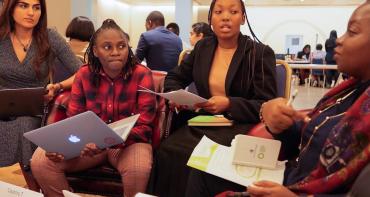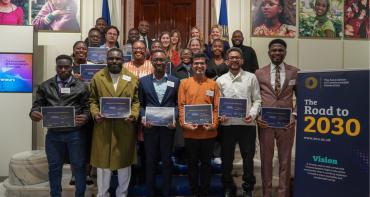Three law students from Kenya, Uganda and Zambia have been crowned joint winners of the first ever Commonwealth Moot Court Competition.

The three-day tournament, which simulated the proceedings of the International Criminal Court (ICC), was held in London at the Commonwealth Secretariat’s headquarters, with a final round hosted by the United Kingdom Supreme Court.
Winners:
- Ms Irene Itol, Makerere University in Kampala, Uganda
- Ms Muchinda Mumba, University of Zambia, in Lusaka, Zambia
- Mr Muhavi Mugambi, Catholic University of Eastern Africa in Nairobi, Kenya
The judges included leading international legal experts and jurists from courts such as the International Criminal Court, Special Court of Sierra Leone and High Court of Uganda.
Under the contest, held from 25 to 27 June 2014, the law students from Africa were given a fictional case involving armed conflict and the exploitation of young men, women and girls. The competitors were tasked with drafting briefs and making oral presentations as part of either the defence or prosecuting team.
Legal arguments centred on whether the accused was guilty of crimes such as genocide and sexual slavery, as well as the jurisdiction of the International Criminal Court, established by the 1998 Rome Statute.
| Did you know? |
| The International Criminal Court (ICC) is a tribunal based in The Hague, Netherlands, established to prosecute individuals for genocide, crimes against humanity and war crimes. It is a court of last resort and has jurisdiction where countries are unable or unwilling to investigate and prosecute offenders. |
Commonwealth Secretariat Rule of Law Director Katalaina Sapolu said: “All the competitors, whether for the defence or for the prosecution, showed great spirit in making their legal arguments. The skills and knowledge gained will stand them in good stead as they forge careers in international criminal and humanitarian law.”
“Building national capacity to practise international criminal law is important because it allows the courts of member countries to try these types of heinous crimes, holding perpetrators accountable and increasing protection of human rights throughout the Commonwealth.”
The competitors were selected after a national coordinator was appointed in each participating Commonwealth country in Africa to promote the competition among law schools. Six students from each country were given the chance to make written submissions to the Commonwealth Secretariat, from which the best 18 were chosen as finalists
Ms Muchinda Mumba, from University of Zambia, based in Lusaka, said she was “excited and shocked” to have been among the three winners. “I hadn’t really had the chance to interact with international criminal law, so this was my first experience, and I have learnt a lot.”
Ms Irene Itol, from Makerere University in Kampala, Uganda, said: “This is a step closer to realising my dream to practise international criminal law, hopefully in one of the international criminal courts. It was educative in a way that I could not have imagined.”
Ms Itol added: “The biggest challenge was when you were told you had to argue for the opposite side, so you had to turn your arguments around. It taught me how to think on my toes, which was really good.”
With six countries represented at the tournament – Kenya, Nigeria, South Africa, Tanzania, Uganda and Zambia – the event was also an opportunity to build peer networks. “I have met people from countries that I had only heard of,” said Mr Muhavi Mugambi, from Catholic University of Eastern Africa, in Kenya. “I have been challenged by the judges and I have been humbled by my opponents.”
The winners were each presented with a Commonwealth Secretariat handbook on humanitarian law as well as an international human rights manual by Oxford University Press. They will be taken on a visit to The Hague to witness first-hand the work of the International Criminal Court, as well as the International Court for Justice and International Criminal Tribunal for the former Yugoslavia.
The project falls under the Commonwealth Secretariat’s mandate to raise awareness of human rights and build the legal capacity of member countries to administer and implement the Rome Statute.
Resource materials created for the competition provide a template for moot courts to be replicated by universities and law schools across the globe. A video of the final at the Supreme Court is available as an educational resource.
2014 Commonwealth Moot Court Competition judges:
- Judge Cuno Tarfusser, Second Vice-President of International Criminal Court
- Justice Shireen Avis Fisher, Former President of Special Court of Sierra Leone
- Lord Kerr of Tonaghmore, UK Supreme Court
- Judge Elizabeth Ibanda-Nahamya, High Court of Uganda



